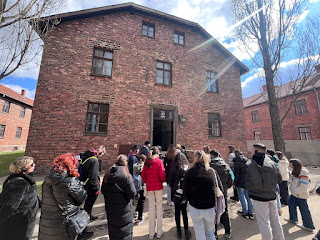Wednesday: all together again

Once the red weather alert had passed, the third session of the mobility in Spain of the K-220 project “The New Values of Democracy in Today’s Europe” allowed us—teachers and students alike—to finally come together at IES Eduardo Primo Marqués. The reunion filled us with joy. The week's guiding theme was women's role in our democracy. The students had prepared and collected numerous responses for a large multinational survey on prejudices, attitudes, customs, and perspectives regarding everyday gender-related issues. On Wednesday, they had the opportunity to analyze the survey data and draw conclusions. Working in multinational groups, they presented the results. In addition, the group took part in a gincana or treasure-hunt-style game around the school. The activities and challenges helped them discover how outstanding women in the sciences and humanities contributed to the development of our civilization. Participants from each country also shared aspects of their own culture...





